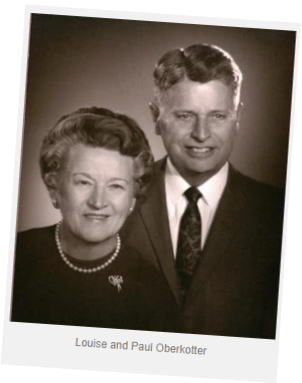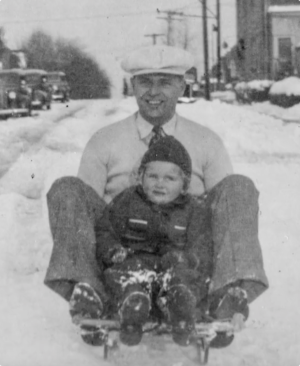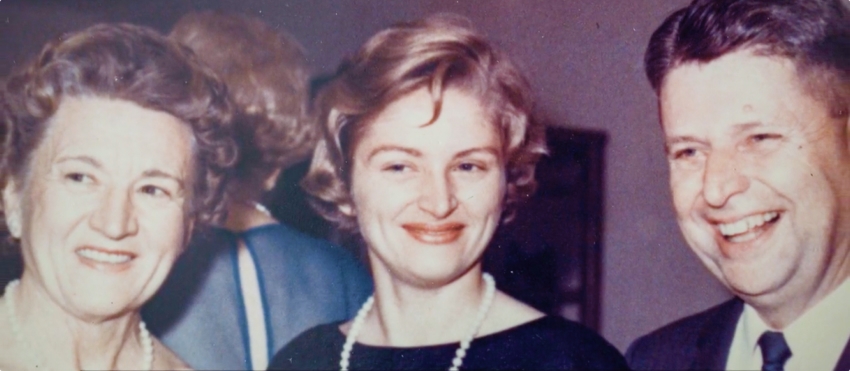The Oberkotter Foundation was founded by Paul and Louise Oberkotter in 1985 and has provided more than $500 million to programs throughout the United States in support of its mission.
 In 1937, Mildred (Mildie) Oberkotter turned two, and the doctor diagnosed her as profoundly deaf.
In 1937, Mildred (Mildie) Oberkotter turned two, and the doctor diagnosed her as profoundly deaf.
Communication options for Mildie were limited in the 1930s. Technology was limited. Hearing aids were not nearly as advanced as they are today. Cochlear implants were a half-century away from being invented. Many families might have braced themselves for a life defined by hardship and limitations. Not Paul and Louise Oberkotter.
Paul and Louise decided that their daughter would learn to communicate through speaking and lip reading. Recognizing the importance of having appropriate support, they sought out hearing specialists, organizations, and other resources. This ignited the spark of an idea. Fifty years later, Paul and Louise Oberkotter established the Oberkotter Foundation to support families and increase access to resources without needing to relocate or send their child away to a specialized school.
“Basically, I had pretty much a normal childhood,” Mildie recalled. “I can’t stress enough how ordinary it all was. That’s important for parents of hard-of-hearing children to know.”

Growing up, Mildie attended a mainstream school, completely integrated into the classroom along with students with typical hearing. She grew up playing with children in the neighborhood and became a social young woman with a rich, fulfilling life.
She earned a degree in accounting/business administration and began a career in sales in New York City before pivoting to computer programming.
As Mildie’s career was beginning, her father Paul’s career was thriving. He had started at UPS as an assistant, rising through the ranks to serve as president, CEO, and chairman of the board. In 1985, after 60 years at UPS, he was ready to retire—but he envisioned a new chapter. He approached Mildie, who was 50 at the time, with an idea that would change their lives: a charitable foundation.

Immediately, Mildie knew how she wanted to make a difference. Together, she and her parents decided to fund support for children who are deaf so they could learn to listen and talk.
So much had changed since Mildie was diagnosed: the first cochlear implant had been received by a preschooler and hearing aids were on the verge of becoming digital. Newborn hearing screenings were beginning to be implemented across the United States. Yet there were still few programs using Listening and Spoken Language (LSL) strategies and principles to teach babies and young children with hearing loss.
The Oberkotters saw a bright future for children with hearing loss. With earlier identification and the new technology on the horizon, the opportunities had never been greater for excellent LSL outcomes. The Oberkotter Foundation sought to support families by removing barriers and increasing access to this communication outcome.
Since 1985, the Oberkotter Foundation, with Mildie as its visionary, has provided more than $500 million. The Foundation’s philanthropic funding and grant investments have been a catalyst for change to improve early intervention services for children with hearing loss and their families. There has been a shift to focus on quality early intervention services, coordinated care between audiologists and LSL professionals, guiding and coaching families, and leveraging telehealth for infants and toddlers. Other major milestones include:
The creation and distribution of Dreams Spoken, a documentary film series, showed millions of parents and professionals the experiences of children who are deaf learning to listen and talk. First released in 1998, the films explained how hearing devices combined with early intervention led to dramatic results in babies and young children. They were a game changer in raising awareness of what was possible for children with hearing loss.
The establishment of 25 new LSL programs across the United States, providing families with access to LSL and pediatric audiology services without the need to relocate or send their child to boarding school. Mildie’s empathy for keeping each child within their family unit inspired the Foundation to create more local offerings to achieve that goal.
Since 2015, Hearing First, an educational initiative of the Foundation, has supported thousands of families and professionals through resources, learning, and community. Providing the right information at the right time helps ensure that babies who are born deaf or hard of hearing are identified early, receive hearing technology, and feel supported along the LSL journey.
Today, guided by Mildie’s vision of the future, the Foundation has honed its mission to focus on innovative ideas and solutions to ensure that families have access to high-quality pediatric audiology and LSL services, regardless of where they live in the United States.
